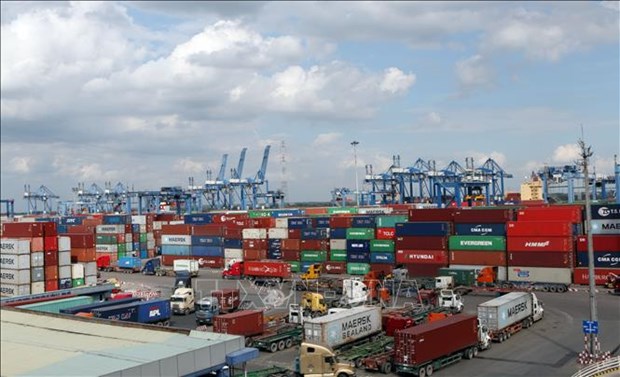03/07/2025, 02:38
Non-state sector becomes main driver of HCM City’s foreign trade in nine months
Non-state sector became the main driver of Ho Chi Minh City’s foreign trade during the first nine months of this year, with its exports and imports increasing 3.5 percent and 39.7 percent, respectively, according to the municipal statistics office.
Non-state sector became the main driver of HCM City's foreign trade during the first nine months of this year, with its exports and imports increasing 3.5 percent and 39.7 percent, respectively, according to the municipal statistics office.
The country’s southern economic hub saw foreign trade growing 9.7 percent year-on-year from January to September, with exports and imports experiencing opposite trends due to impacts of the worst-ever COVID-19 resurgence, which hit the city since May.
In September, exports totalled 2.37 billion USD, a 5.7 percent decrease month on month. Of the figure, the public sector contributed 93.4 million USD, down 4.9 percent month on month; the non-state sector, 816.3 million USD, up 13.7 percent; and the foreign-invested sector, 1.25 billion USD, down 14.9 percent.
In the first three quarters of the year, the city shipped abroad 31.5 billion USD worth of goods and services, a year-on-year drop of 3.4 percent. Of the total, the state-owned sector contributed 1.53 billion USD, down 15.2 percent year on year; the non-state sector, 8.43 billion USD, up 3.5 percent; and the foreign-invested sector, 18.6 billion USD, down 6.5 percent.
The agriculture sector generated close to 2.9 billion USD from exports during the period, up 8.5 percent year on year and accounting for 10.5 percent of the total shipments. The industrial sector’s exports, meanwhile, fell 13.9 percent to 19.2 billion USD, representing some 70 percent of the total.
China remained HCM City’s largest buyer in nine months, importing 6.65 billion USD worth of goods and services, down 15.9 percent year on year. It was followed by the US, Japan and the EU.
The city spent over 4.1 billion USD on imports last month, down 8 percent month on month. The nine-month figure, however, spurred 21.3 percent year on year to 44.3 billion USD, with imports of the non-state sector surging 39.7 percent to 19.1 billion USD and that of the foreign-invested sector rising 12.2 percent to 18.8 billion USD./.
The country’s southern economic hub saw foreign trade growing 9.7 percent year-on-year from January to September, with exports and imports experiencing opposite trends due to impacts of the worst-ever COVID-19 resurgence, which hit the city since May.
In September, exports totalled 2.37 billion USD, a 5.7 percent decrease month on month. Of the figure, the public sector contributed 93.4 million USD, down 4.9 percent month on month; the non-state sector, 816.3 million USD, up 13.7 percent; and the foreign-invested sector, 1.25 billion USD, down 14.9 percent.
In the first three quarters of the year, the city shipped abroad 31.5 billion USD worth of goods and services, a year-on-year drop of 3.4 percent. Of the total, the state-owned sector contributed 1.53 billion USD, down 15.2 percent year on year; the non-state sector, 8.43 billion USD, up 3.5 percent; and the foreign-invested sector, 18.6 billion USD, down 6.5 percent.
The agriculture sector generated close to 2.9 billion USD from exports during the period, up 8.5 percent year on year and accounting for 10.5 percent of the total shipments. The industrial sector’s exports, meanwhile, fell 13.9 percent to 19.2 billion USD, representing some 70 percent of the total.
China remained HCM City’s largest buyer in nine months, importing 6.65 billion USD worth of goods and services, down 15.9 percent year on year. It was followed by the US, Japan and the EU.
The city spent over 4.1 billion USD on imports last month, down 8 percent month on month. The nine-month figure, however, spurred 21.3 percent year on year to 44.3 billion USD, with imports of the non-state sector surging 39.7 percent to 19.1 billion USD and that of the foreign-invested sector rising 12.2 percent to 18.8 billion USD./.
RECOMMENDED TOPICS









